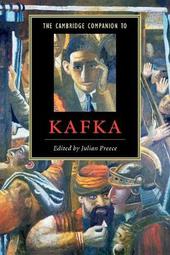
|
The Cambridge Companion to Kafka
Paperback / softback
Main Details
Description
This Companion of specially-commissioned essays offers a comprehensive account of his life and work, providing a rounded contemporary appraisal of Central Europe's most distinctive Modernist. Contributions cover all the key texts, and discuss Kafka's writing in a variety of critical contexts such as feminism, deconstruction, psychoanalysis, Marxism, and Jewish studies. The essays are enhanced by supplementary material including a chronology of the period and detailed guides to further reading. They will be of interest to students of German, European and Comparative Literature, and Jewish Studies.
Author Biography
Julian Preece is Senior Lecturer at the School of European Culture and Languages at the University of Kent at Canterbury. He is the author (with Waldemar Lotnik) of Nine Lives: Ethnic Conflict in the Polish-Ukrainian Borderlands and The Life and Work of Gunter Grass: Literature, History, Politics (2001).
Reviews'... provides a valuable overview of varied aspects of Kafka's works, including a relevant up-to-date bibliography at the end of each essay.' Poetics Today 'The Cambridge Companion series is renowned for its well-researched and accessible studies, and this is no exception. ... The inclusion of such a wide range of material in this volume makes it an ideal introduction to Kafka's work. The material is presented lucidly, and each contribution takes into account previous reception as well as presenting new readings and interpretations. The volume also benefits from English translations throughout, thus serving an interdisciplinary as well as a Germanist readership.' MLR
|